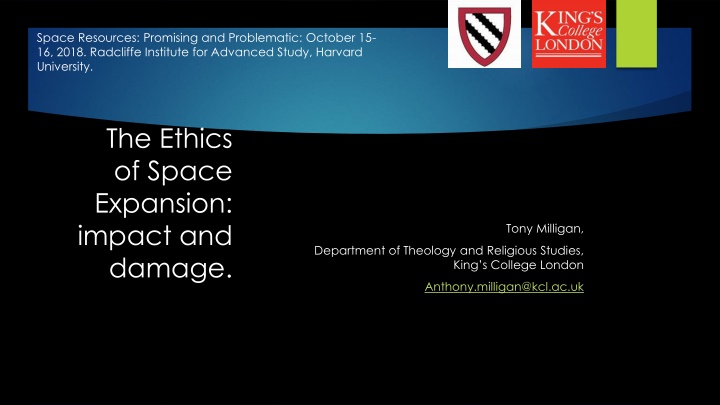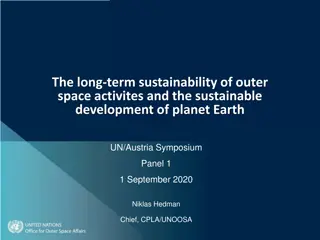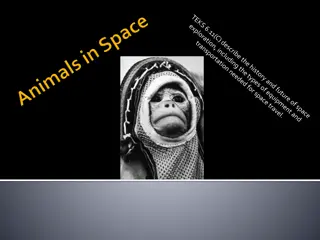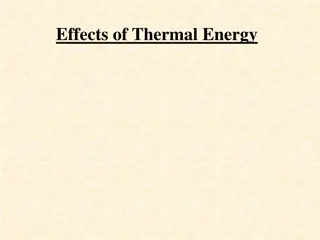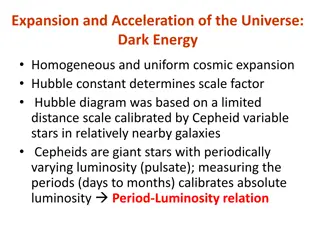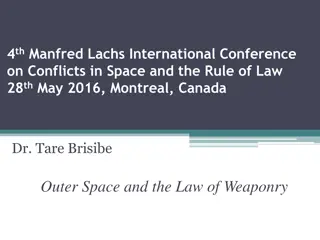Ethics and Impacts of Space Expansion
Ethical considerations surrounding space exploration and expansion are discussed, highlighting both promising and problematic aspects. The debate includes the value of space science, environmental impacts, and the need for responsible expansion to mitigate potential damages. Topics such as launch sites, space debris, and the ethical challenges of extending human activity into space are explored.
Download Presentation

Please find below an Image/Link to download the presentation.
The content on the website is provided AS IS for your information and personal use only. It may not be sold, licensed, or shared on other websites without obtaining consent from the author.If you encounter any issues during the download, it is possible that the publisher has removed the file from their server.
You are allowed to download the files provided on this website for personal or commercial use, subject to the condition that they are used lawfully. All files are the property of their respective owners.
The content on the website is provided AS IS for your information and personal use only. It may not be sold, licensed, or shared on other websites without obtaining consent from the author.
E N D
Presentation Transcript
Space Resources: Promising and Problematic: October 15- 16, 2018. Radcliffe Institute for Advanced Study, Harvard University. The Ethics of Space Expansion: impact and damage. Tony Milligan, Department of Theology and Religious Studies, King s College London Anthony.milligan@kcl.ac.uk
Typical Appeals A duty to extend life/human life. The value of space science. The need for a shift in perspective that space activity is uniquely placed to bring. We have an innate urge to explore which should not be frustrated. We must back up the biosphere. Space can relieve resource or population pressures on the Earth. There are major economic spin-offs. There is no clear-cut justification for space exploration.
Ethical arguments geared to an in principle rejection of all space activity face a problem of realpolitik: this is going to happen. There is also no knock-down argument against space exploration. If such arguments draw upon an understanding of human action as unavoidably or inherently bad, then they could also carry implausible implications for how we live now, here on Earth.
doing things in a suitable way and with appropriate constraints Ethical discussion of these matters may best be thought of as a concern about how best to expand our presence. minimising repetitions of past mistakes framing the expansion process in a socially beneficial way
The focus below will be upon some of the potentially damaging impacts that an expansion of our activities in space might have.
Damaging impact o Launch sites
Damaging impact o Launch sites o Space debris (at GEO and especially at LEO)
Space debris Both an issue of environmental harm and justice. Typical problem of environmental injustice: the burden is likely to be carried, in the future, by a significant number of launch states but the problem has been generated by a much smaller number of launch states.
Damaging impact o Launch sites o Space debris (at GEO and especially at LEO) o Asteroids
Asteroids Should we worry about damage to asteroids?
As long as we are talking about asteroids in the restricted sense (not minor planets in the asteroid belt like Vesta or Ceres) terrestrial grounds for environmental protection (e.g. protecting integrity and/or diversity) are unlikely to carry over effectively. There is little talk about the need for asteroid protection. Asteroid Mining Ethical examinations of asteroid mining are not likely to focus upon in situ damage but may focus upon its sustainability, and about how best to contain the impact of such mining elsewhere (on our terrestrial economy, on the minor planets and on Mars).
Damaging impact o Launch sites o Space debris (at GEO and especially at LEO) o Asteroids o Lunar strip mining for 3He
Lunar Mining Given the variability of 3He deposits, their concentration in the upper regolith, 3He mining could require extensive surface disruption. This makes such mining a far strong candidate for an environmental ethics critique.
Ethical Lunar integrity may be placed at risk by extensive mining for 3He, or extensive regolith use for habitat construction. The moon is inherently important or else it is a culturally significant object, part of our common heritage. Problems of Lunar Mining Future science may lose important opportunities. Future generations may lose important experiential opportunities. Such change is unwelcome and irreversible.
Asteroid mining for 3He, although technically more demanding than lunar mining, could relieve pressures towards lunar mining. Impact of asteroid mining-1 This may help an ethical case for asteroid mining.
Extensive asteroid of any sort (e.g. for platinum group metals) could, however, bring a problem of containment. Impact of asteroid mining-2 A sustaining mining industry would require access to the Main Belt, and a base of operations for the latter somewhere with a shallow gravity well. Mars fits the bill. This would give ground for reasonable ethical concern.
Unless we restrict ourselves to a specialised theory which holds that ethical concern is appropriate only where there is sentient life (sentientism) or an existing ecosystem (e.g. a Land Ethic ) then various environmental ethical considerations which apply in the case of the Earth will also apply in the case of Mars.
Unless we restrict ourselves to a specialised theory which holds that ethical concern is appropriate only where there is sentient life (sentientism) or an existing ecosystem (e.g. a Land Ethic ) then various environmental ethical considerations which apply in the case of the Earth will also apply in the case of Mars.
Note: in each case of damaging impact above, ethical constraining can also be seen (plausibly) as enabling it keeps open future opportunities which might otherwise be lost.
At least some of the issues above also pose a dilemma about how we run Do we: A) Go metaphysically deep and talk about value and inherent value of places and of possible microbial life? ethical B) Stay more pragmatic and appeal to universally accepted considerations: human interest, future generations, sustainability and distributive justice (who gets to own or to appropriate things)? arguments in space.
precursor- apt or policy- apt ? This might not be an either / or story. In precursor discussions, we may want to draw upon matters of depth (and so include various perspectives on value or inherent value ). In policy discussions, we may want to draw upon insights from precursor discussions, but in a way more likely to yield a workable consensus.
